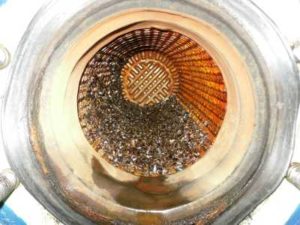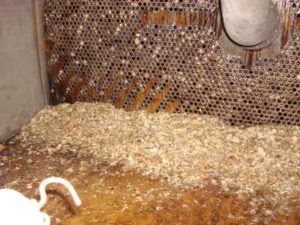
The life of a mussel in the water system
When water is piped into a ship or cooling unit mostly filters or strainers are used to prevent the passage of marine growth. Usually this works quite well and no fully grown mussels or fish enter the piping system. However small larvae at the very beginning of its life cycles can pass such filters. The larvae settles in places with less flow or other favorable conditions to grow until they reach a certain size. When big enough they are flushed downstream by the passing water. They now accumulate at narrow places (bottleneck like) – often at the inlet of heat exchangers.

Merus can reduce the marine growth in water systems significantly
In the past 20 years we have installed Merus Rings on vessels, offshore platforms and onshore and could successfully stop or reduce marine growth. We install our Rings as close as possible to the filters. This is how we ensure to treat the problem right at the beginning, the entering point of the sea water. On a vessel or offshore this is typically direct behind the sea chest. Onshore Merus Rings are installed at the landfall of the pipe. It is still not feasable to install Merus Rings sub sea.
In many cases it is sufficient to install Merus Rings at the sea chest to treat the whole system. If the water system is very big and supplies many consumers, we install backup Rings to protect the single machines.
Once installed the two effects of the Merus Technology work together to solve the problems of marine growth in the pipe. First of all the effect against typical problems in all water (incrustations and corrosion) ensure a clean and therefore smooth surface in the pipe. Without rough spots there are no spots for larvae to settle.
As a result these are flushed through the piping system and passing heat exchangers without causing problems.
Secondly in consequence of our water treatment a film of pure water remains stable directly at the surface. This increases the first effect by reducing friction and prevents the larvae from getting sufficient grip to settle and grow. The same effect works against barnacles and other small organisms in the sea. The results are the best if there is a constant flow of water. All these parameters of the piping system (size, flow) are taken into consideration when we plan the installation.

No chemical treatment is required against seashells
Usually when we meet our customers in this industry first, biozides have been used to get rid of marine growth. It can be an easy way to increase flow or ensure sufficient cooling.
Chemicals like chlorine for instance are added to the water to clean blocked heat exchangers. Together with dead seashells it is washed out of the system into the open sea. Everyone can imagine that this is not environmentally friendly and can have wide implications for other organisms in the sea. Fish passing by are harmed which has a negative effect on the ecosystem.
These drastic methods are less and less accepted by authorities and politics. For example in the North Sea the usage of certain chemicals – as the chlorine mentioned above – is not allowed anymore.
What do customers say?
The most recent experience (2018) confirms again, that right after the installation of the Merus Ring a big amount of mussels is flushed out of the system. Therefore in the first phase after the installation the filters had to be cleaned more often. These mussels were growing in the water system before our installation. Once the system has been cleaned only by installing Merus Rings there were just very few mussels or seashells in the system. At this point the customer stopped the dosing of chemicals.
The client is satisfied with the performance of the Merus Ring and plans more installations at other systems.
